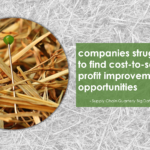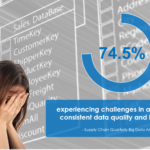Pinpointing Profit Leakage
Summary: Earnings reports are a key indicator of a company’s financial health but they are an aggregation of a vast array of incurred costs and realized revenues associated with running a business. The financial impact of specific decisions in managing product and customer transactional costs and revenues is typically visible at an aggregate level such as categories of costs or revenues by customer or customer groupings.
However, individual actions or decisions in sourcing, supply chain or sales can significantly impact operating margins and create negative performance exceptions. Profit leakage exceptions can be hidden in standard financial reporting. Finding these specific profit leakage opportunities and the root cause can be like searching for a needle in a haystack.
Case In Point: On a monthly basis, a Retailer would have a team of Financial Planning & Analysis Managers perform analysis on procurement, specific supply chain activities and store sales to try and find significant opportunities associated with incurred costs or reductions in revenues. The process was time consuming and did not catch all of the significant exceptions that needed to be analyzed. A decision was made to create a scalable approach that would not only review all exceptions but would also track the progress of resolving previously identified items.
Action: To be scalable, the company recognized that the solution had to have several key characteristics. It had to provide for an approach that would ensure that the data that would be analyzed would be accurate and specific. The identification of the exceptions needed to be fast and the ones with the biggest impact prioritized. Finally, the analysis needed to examine opportunities across the entire operation including procurement, supply chain, inventory and sales activities on a recurring basis. The company selected a cloud-based technology platform that provided data governance capabilities as well as robust processing and reporting.
With the initial activation of the solution, profit leakage exceptions across every functional area were identified that totaled several million dollars. What would historically take the company weeks to accomplish was now done on a repeatable basis in a matter of days.
Takeaway: Profit improvement opportunities can be significant by having the ability to pinpoint exceptions in financial performance by product, customer, store or channel. For some, the root cause may not be something that can be easily changed. But for many exceptions, actions can be taken to minimize the future impact on margin erosion. Having this type of robust and repeatable capability insures that the company is proactively looking for all opportunities to maximize shareholder value.
I would love to know your thoughts on this. Please comment on this posting or email me at [email protected] .
All the best,
Richard Sharpe
Richard Sharpe is CEO of Competitive Insights, LLC (CI), a founding officer of the American Logistics Aid Network(ALAN) and designated by DC Velocityas a Rainmaker in the industry. For the last 25 years, Richard has been passionate about driving business value through the adoption of process and technology innovations. His current focus is to support CI’s mission to enable companies to gain maximum value through specific, precise and actionable insights across the organization for smarter growth. CI delivers Enterprise Profit Insights (EPI) solutions that enable cross-functional users to increase and protect profitability. Prior to his current role, Richard was President of CAPS Logistics, the forerunner of supply chain optimization. Richard is a frequent speaker at national conferences and leading academic institutions. His current focus is to challenge executives to improve their company’s competitive position by turning enterprise wide data from a liability to an asset through the use of applied business analytics.




